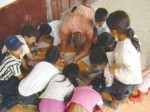Corps provides long-distance learning

Some graduate students at USF’s College of Public Health may prefer to earn their master’s degrees thousands of miles away from lecture halls and libraries.
That’s what Zac Dreaden, a USF graduate student living in Ecuador, is doing.
Since April 2003, the College of Public Health has participated in the Master’s International (MI) Peace Corps program. Through a partnership with the Peace Corps, students travel to developing countries to prepare for futures in health-related fields.
“Being able to have the time to really integrate into another culture and be able to get past some of our own ego- and ethnocentric views is probably the biggest personal benefit from this program,” Dreaden said.
Dreaden found out about the Master’s International (MI) program while studying abroad in Spain. He said he originally planned to go straight into the Peace Corps before reading about the program on the Peace Corps’ Web site.
“I decided to do the MI program so that I could hopefully have a bigger impact as a Peace Corps volunteer,” he said.
Barbara Kennedy, Master’s International Peace Corps program coordinator for the College of Public Health, said there have been three MI student volunteers at USF to date. While Dreaden was assigned Ecuador, the other two were sent to Honduras and Kenya.
After taking courses in the Global Health program at USF for about a year, Dreaden went through nine weeks of pre-service language, cross-cultural and technical training before being assigned to a country.
Dreaden will have spent nearly two years in Yantzaza, Ecuador, a small jungle village with a population of 6,000 people, by the time he returns to USF in time for graduation.
Although Dreaden had some trouble adjusting to a new place and culture, he recalls one of his proudest moments when he was able to persuade doctors to give presentations to high school students about various health issues – something he said is uncommon.
The last thing Dreaden will have to complete before coming home is his Special Project. In it, he will record all the changes he’s gone through on a personal level since becoming a Peace Corps volunteer.
Typically, students spend 27 months in the country to which they are assigned. Most of their expenses, including housing and medical care, are covered. USF also provides a tuition and fee waiver for nine credit hours as an incentive for students to participate in the program.
The College of Business also became part of the MI program in 2003. Florida International University and Florida State University offer MI programs in education, environmental studies and urban and regional planning.
After completing a full term in the Peace Corps overseas, students automatically have non-competitive eligibility for federal government jobs.
Aside from having more career opportunities and learning a new language, Dreaden said there’s one other thing he hopes to bring home in May.
“All the memories and possible friendships,” he said.







